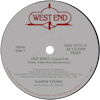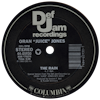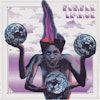When Mel Cheren passed away in December 2007, reports of his death understandably referenced the pivotal role he played in the disco and nightlife scene of New York in its heyday of the late ’70s and ’80s. His label, West End, as well as his roles as financial backer to the Paradise Garage and mentor to DJ Larry Levan, is well known. Cheren also unwittingly provided hip-hop with two primal b-boy classics—a couple of records that were staples of any early jam and whose breaks provided many a current veteran with their introduction to cutting doubles.
One of these was “Sesso Matto,” a re-pressing of a 1973 Italian soundtrack whose title track happened to have a good beat (and a chorus a lot like “Soul Makossa”). The other record had Cheren’s more direct input, and was West End Records’ first bona fide hit.
“Karen Young was a white soul singer from Philadelphia who had once dated Wilson Pickett,” writes Cheren in his autobiography. “She was frumpy, knew nothing about makeup and clothes, loved her Quaaludes and was afraid of heights.” But Cheren heard something he liked in an unreleased song she’d recorded called “Hot Shot.” He decided to release an extended disco mix, which included a long percussion break preceded by a Young vocal riff on the title. It was this bit that reportedly inspired Grandmaster Flash to experiment with back-spinning (in other words, using two copies of a record to run the same phrase in quick succession as a prelude to letting the full break drop).
The song itself, while regarded as a disco classic, may be a little camp for most. But it underscores the lesser-acknowledged symbiotic relationship that dance music had with early hip-hop, and birthed one the most popular early breakbeats.


